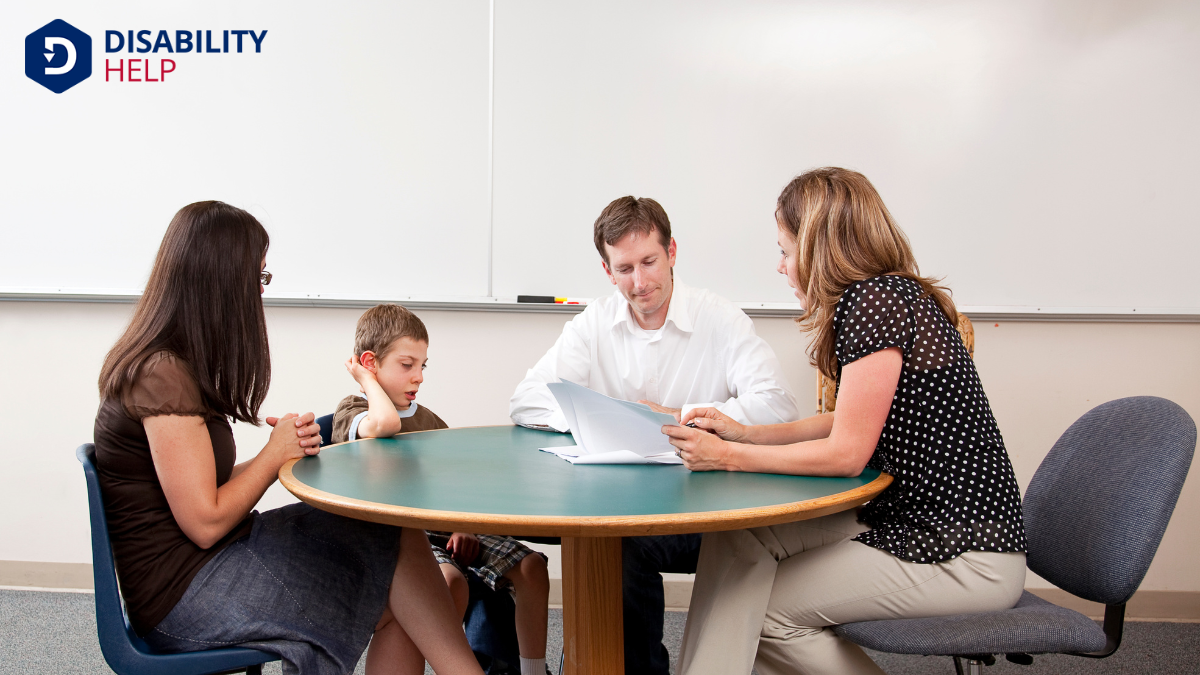As we navigate the complexities of anti-discrimination laws, it's vital to recognize the rights disabled parents have, especially under the ADA and IDEA. These laws don't just protect against discrimination; they guarantee we have access to essential accommodationsModifications or adjustments in healthcare settings to support patients with disabilities. in education, employment, and beyond. But how do these rights play out in real life, and what challenges remain? Let's explore how these protections shape the experiences of disabled parents and their families.
Key Takeaways
- Disabled parents are protected from discrimination under the ADA, ensuring equal opportunities in employment and public services.
- Schools must provide necessary accommodations for disabled parents, including accessible formats and interpreters, under IDEA and Section 504A provision of the Rehabilitation Act of 1973 that prohibits discrimination based on disability in p....
- Employers are required to provide reasonable accommodations, such as flexible schedules, to disabled parents without retaliation under the ADA.
- Healthcare facilities must offer appropriate accommodations, such as sign language interpreters, to disabled parents under anti-discrimination laws.
- Disabled parents are entitled to fair treatment in family law and custody cases, backed by legal protections against bias and misconceptions.
Understanding the Americans With Disabilities Act (ADA)
The Americans With Disabilities Act (ADA)A U.S. law that prohibits discrimination against individuals with disabilities in all areas of publi... is an important piece of legislation that protects the rights of individuals with disabilities, including parents. Together, let's explore how this law impacts our lives.
The ADA prohibits discrimination in several areas, such as employment, public accommodations, and governmental services. For us, this means that we're entitled to equal opportunities and access to various public and private services.
The ADA requires reasonable accommodations, guaranteeing we can effectively participate in society without facing unnecessary barriers. These accommodations might include modified work schedules, accessible transportation options, or communication aids.
Legal Protections for Disabled Parents in Education

When it comes to education, disabled parents have specific legal protections guaranteeing their rights are respected. These protections, primarily under the Individuals with Disabilities Education Act (IDEA) and Section 504 of the RehabilitationThe process of helping individuals with disabilities achieve and maintain their optimal physical, se... Act, guarantee that we, as parents, can participate fully in our children's education.
Schools must provide necessary accommodations for us to attend meetings, access information, and communicate effectively. For instance, if we need materials in accessible formats or require interpreters, schools are obligated to provide them.
Moreover, these laws also prevent discrimination against our children based on their disabilities, guaranteeing they receive equal educational opportunities.
Workplace Rights for Disabled Parents
While we've explored our rights in the educational domain, our journey doesn't stop there.
In the workplace, disabled parents are protected under laws like the Americans with Disabilities Act (ADA), ensuring we’re not discriminated against due to our disabilities. We’re entitled to reasonable accommodations, such as flexible schedules or adaptive equipmentDevices that assist individuals with disabilities in performing ADLs, such as grab bars or shower ch..., to perform our jobs effectively.
It’s essential that we communicate our needs clearly to our employers, who must engage in an interactive process to find suitable solutions. Remember, retaliation for asserting our rights is illegal.
We should feel empowered to advocate for ourselves, knowing these protections exist. By understanding these rights, we can better navigate work environments and balance our professional and parental responsibilities with confidence and dignity.
Access to Healthcare and Support Services
Maneuvering the healthcare system can be intimidating, but as disabled parents, we're entitled to access essential healthcare and support services that cater to our unique needs.
Anti-discrimination laws guarantee that we receive appropriate accommodations, making healthcare facilities accessible and equitable. We should know that we can request assistance, such as sign language interpreters or adaptive equipment, to facilitate communication and mobility during appointments.
Support services extend beyond medical treatment, encompassing programs like in-home care, therapy, and community resources designed to assist us in parenting effectively.
It's vital we advocate for our rights and collaborate with healthcare professionals to customize care plans that address our specific circumstances. By understanding our entitlements, we can better navigate the system and guarantee that our families thrive.
Challenges in Family Law and Custody Cases

Maneuvering family law and custody cases presents unique challenges for disabled parents, yet understanding our rights under anti-discrimination laws is essential.
We must recognize that biases and misconceptions about our abilities can cloud legal judgments. Courts may wrongly assume that a disability impairs our capacity to parent effectively. It's important to assert our rights and demonstrate our competence as caregivers.
To strengthen our case, let's gather evidence that highlights our parenting skills and capabilities. This might include testimonials from people who know us well or documentation of our involvement in our children's lives.
We should also be aware of legal protections under the Americans with Disabilities Act (ADA) and other relevant laws. These tools can help guarantee fair treatment in custody disputes, empowering us to advocate for our families.
Barriers in Public Accommodations and Transportation
Maneuvering public accommodations and transportation can be particularly challenging for disabled parents, as accessibilityThe design of products, devices, services, or environments to be usable by people with disabilities.... barriers often hinder our ability to fully participate in daily activities with our children.
We face issues like inaccessible public buildings, insufficient ramps, and narrow doorways. These obstacles can make it difficult to access schools, parks, and grocery stores.
Public transportation also poses challenges; buses or trains may lack accessible seating or adequate space for mobility devices, making travel unpredictable and stressful.
While anti-discrimination laws like the ADA exist to protect our rights, enforcement and compliance can be inconsistent.
When facilities fail to meet accessibility standards, it limits our freedom and independence.
We need spaces that accommodate all abilities, ensuring we can share in the same experiences as other families.
Advocacy and Policy Initiatives for Enhanced Rights
Let's explore how advocacyThe act of arguing in favor of, supporting, or defending the rights and interests of individuals or ... and policy initiatives are shaping a brighter future for disabled parents.
We're seeing significant advancements in the legislative framework that aim to protect and empower these families.
Legislative Framework Advancements
While the path to ensuring equitable rights for disabled parents has been challenging, recent legislative developments show promising strides.
We've seen advancements like the amendment of existing anti-discrimination laws to better address the unique needs of disabled parents. These changes don’t just enhance legal protections but also foster a more inclusive understanding of parenting rights.
For instance, some jurisdictions have started to recognize the importance of adaptive parenting tools and services, ensuring that disabled parents aren’t unfairly judged based on their disabilities.
Legislative focus has expanded to include the provision of reasonable accommodations, making it easier for us to advocate for our families. By refining these laws, we’re creating a fairer landscape where disabled parents can thrive and be supported in their parenting roles.
Supportive Community Alliances
Unity is our strongest tool in advocating for the rights of disabled parents.
By forming alliances with community organizations and advocacy groups, we amplify our voices and push for meaningful change. These alliances focus on creating policies that recognize and protect the unique challenges disabled parents face.
We can collaborate with policymakers to guarantee that anti-discrimination laws aren't only enforced but also expanded to cover all aspects of parenting.
Frequently Asked Questions
How Can Disabled Parents Ensure Their Rights Are Respected by Landlords?
We can guarantee our rights by clearly communicating our needs to landlords, providing necessary documentation, and knowing our legal protections. Let's stay informed, assertive, and ready to advocate for accessible housing accommodations that respect our rights.
What Accommodations Are Available for Disabled Parents in Recreational Activities?
We can access inclusive programs and adaptive equipment in recreational activities. Let's advocate for facilities to offer modifications, ensuring we enjoy these experiences with our families. It's essential to communicate our needs to create a welcoming environment.
Are There Specific Rights for Disabled Parents Who Homeschool Their Children?
Let's explore the rights of disabled parents who homeschool. We should guarantee they get equal accessThe principle that all individuals, including those with disabilities, should have equal opportunity... to resources and support. These rights help us create an inclusive environment, promoting successful homeschooling for all families.
How Do Disabled Parents Navigate Challenges in Accessing Child Care Services?
We face hurdles accessing childcare, but by understanding our rights and advocating for accommodations, we secure necessary support. Let’s connect with local resources and share experiences to better navigate these challenges together, ensuring our children's well-being.
What Community Resources Support Disabled Parents in Emergency Situations?
Let's explore community resources that support disabled parents during emergencies. We should connect with local advocacy groups, social services, and nonprofit organizations. They offer assistance, guidance, and essential services to guarantee families stay supported and informed.
Conclusion
As disabled parents, we have significant rights under anti-discrimination laws like the ADA and IDEA, ensuring fair treatment in education, the workplace, and beyond. It's vital we comprehend these protections so we can advocate for ourselves and our children effectively. Despite challenges in areas like family law and public accommodations, our collective voice drives change. Let's continue pushing for policy initiatives that enhance our rights and break down barriers, creating a more inclusive society for all families.






